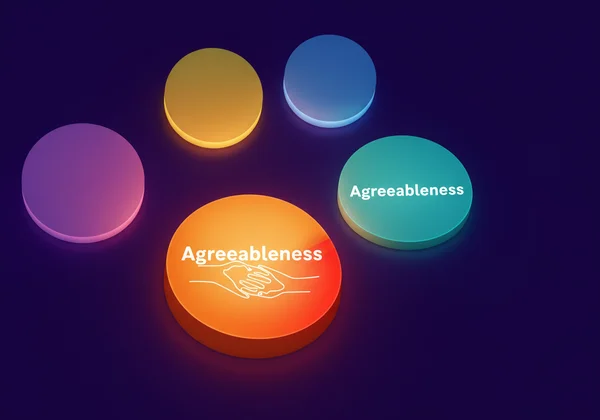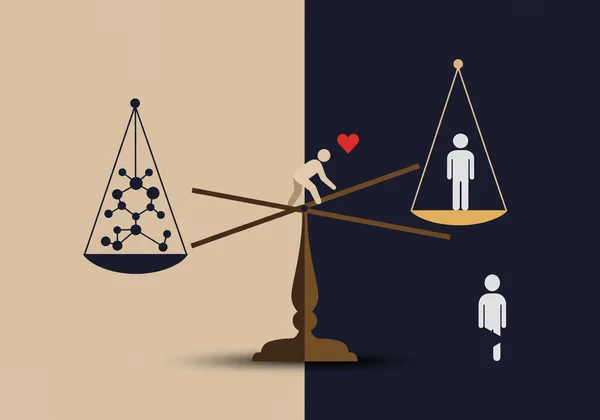Big 5 Persönlichkeitstest: Das Verständnis Ihres Verträglichkeitsmerkmals
Willkommen zu unserem eingehenden Einblick in die faszinierende Welt der Persönlichkeit. In unserer Serie über das wissenschaftlich validierte Big 5 Modell haben wir bereits Offenheit, Gewissenhaftigkeit, Extraversion und Neurotizismus behandelt. Heute runden wir das Bild ab mit dem Merkmal, das unsere sozialen Interaktionen mehr als jedes andere prägt: Big 5 Verträglichkeit. Was bedeutet es wirklich, verträglich zu sein? Es ist weit mehr als nur „nett“ zu sein. Dieses Merkmal prägt maßgeblich unsere Fähigkeit zu Mitgefühl, Kooperation und zur Aufrechterhaltung sozialer Harmonie.
Zu verstehen, wo Sie auf dem Spektrum der Verträglichkeit stehen, kann tiefgreifende Einblicke in Ihre Beziehungen, Berufsentscheidungen und Ihr allgemeines Wohlbefinden ermöglichen. Es erklärt, warum manche Menschen natürliche Teamplayer sind, während andere Debatten und Skepsis schätzen. Sind Sie bereit zu entdecken, wie dieses Kernmerkmal Ihr Leben beeinflusst? Sie können ein klares, wissenschaftliches Maß Ihrer Persönlichkeit erhalten, indem Sie unseren kostenlosen Big 5 Persönlichkeitstest absolvieren.
Was ist das Persönlichkeitsmerkmal Verträglichkeit?
Verträglichkeit ist eine der fünf Kerndimensionen der Persönlichkeit im Fünf-Faktoren-Modell (auch bekannt als OCEAN-Modell). Sie spiegelt individuelle Unterschiede in der Tendenz wider, mitfühlend und kooperativ zu sein, im Gegensatz zu einer misstrauischen und antagonistischen Haltung anderen gegenüber. Im Wesentlichen geht es bei diesem Merkmal um Ihre grundlegende Ausrichtung auf soziale Beziehungen und darum, wie Sie diese gestalten.
Menschen mit unterschiedlichen Verträglichkeitsgraden gehen soziale Situationen mit unterschiedlichen Denkweisen an. Eine Person könnte Gruppenharmonie und emotionale Verbindung priorisieren, während eine andere Offenheit und objektive Wahrheit über alles andere stellt. Keine der beiden Herangehensweisen ist grundsätzlich besser; sie sind einfach unterschiedliche Strategien für die Interaktion mit der Welt. Indem Sie dieses Merkmal erforschen, können Sie Ihre sozialen Instinkte besser verstehen und lernen, wie Sie sie nutzen können.

Verträglichkeit definieren: Mitgefühl, Vertrauen und Kooperation
Im Kern setzt sich Verträglichkeit aus mehreren verwandten Facetten zusammen, darunter Altruismus, Vertrauen, Bescheidenheit und Nachgiebigkeit. Personen, die in diesem Merkmal hohe Werte aufweisen, neigen dazu, empathisch, freundlich und rücksichtsvoll zu sein. Sie gehen im Allgemeinen davon aus, dass andere gute Absichten haben und sind eher bereit, Kompromisse einzugehen, um Konflikte zu lösen. Ihr Verhalten entspringt oft einer echten Sorge um das Wohlergehen anderer.
Diese Neigung zur Kooperation macht hoch verträgliche Personen zu wertvollen Mitgliedern jedes Teams oder jeder Gemeinschaft. Sie sind der soziale Kitt, der starke Bindungen aufbaut und ein unterstützendes Umfeld fördert. Ihr natürliches Vertrauen in andere ermöglicht es ihnen, effektiv zusammenzuarbeiten und Beziehungen auf der Grundlage von gegenseitigem Respekt und Verständnis aufzubauen.
Verträglichkeit im Big 5 Modell (OCEAN)
Innerhalb des OCEAN-Rahmenwerks bietet Verträglichkeit (das „A“) eine entscheidende Linse, um unsere soziale Natur zu verstehen. Sie interagiert dynamisch mit den anderen vier Merkmalen. Zum Beispiel könnte eine Person, die sowohl in Extraversion als auch in Verträglichkeit hoch ist, eine warme, enthusiastische Menschenfreundin sein, während jemand, der in Verträglichkeit niedrig, aber in Gewissenhaftigkeit hoch ist, eine hoch effektive, aber anspruchsvolle Führungskraft sein könnte, die Ergebnisse über Gefühle priorisiert.
Das Verständnis von Verträglichkeit im Kontext Ihres vollständigen Persönlichkeitsprofils ist entscheidend. Ein einfacher Wert ist nur ein Ausgangspunkt. Unser umfassendes Persönlichkeitsbewertungstool hilft Ihnen, das Gesamtbild zu sehen und aufzuzeigen, wie Ihre einzigartige Kombination von Merkmalen Ihr Leben prägt.
Hohe Verträglichkeit: Stärken und potenzielle Herausforderungen
Ein hoher Wert auf der Verträglichkeitsskala ist oft mit positiven sozialen Vorteilen verbunden. Diese Personen sind typischerweise beliebt, haben stabile Beziehungen und werden als vertrauenswürdig und hilfsbereit angesehen. Sie glänzen in Rollen, die Fürsorge, Teamarbeit und Dienst am Nächsten erfordern, wie zum Beispiel im Lehr-, Gesundheits- und Kundenservicebereich.
Wie jedes Merkmal birgt jedoch auch ein hoher Grad an Verträglichkeit eigene Herausforderungen. Gerade die Eigenschaften, die diese Personen so sympathisch machen, können manchmal ihren eigenen Interessen zuwiderlaufen. Das Finden eines gesunden Gleichgewichts ist entscheidend für den persönlichen und beruflichen Erfolg.
Die prosoziale Kraft: Harmonie und starke Beziehungen aufbauen
Die größte Stärke hoher Verträglichkeit ist ihre prosoziale Kraft. Menschen mit diesem Merkmal sind von Natur aus geneigt, anderen zu helfen, ihre Ressourcen zu teilen und diejenigen in Not zu trösten. Ihre Empathie ermöglicht es ihnen, sich tief mit Menschen zu verbinden und starke, dauerhafte Beziehungen aufzubauen, die auf Vertrauen und gegenseitiger Fürsorge beruhen.
In Gruppeneinstellungen sind sie Mediatoren und Friedensstifter. Sie glätten Meinungsverschiedenheiten, fördern die Zusammenarbeit und stellen sicher, dass sich jeder gehört und wertgeschätzt fühlt. Diese Fähigkeit, soziale Harmonie aufrechtzuerhalten, macht sie in Familien, Freundschaften und am Arbeitsplatz unverzichtbar. Ihr Fokus auf Kooperation führt oft zu Win-Win-Ergebnissen, bei denen alle profitieren.

Die Fallstricke navigieren: Wenn zu viel Verträglichkeit Ihnen schadet
Die größte Herausforderung für Menschen mit hoher Verträglichkeit ist das Risiko der Selbstvernachlässigung. Ihr Wunsch, anderen zu gefallen und Konflikte zu vermeiden, kann es ihnen erschweren, ihre eigenen Bedürfnisse durchzusetzen und gesunde Grenzen zu setzen. Dies kann dazu führen, dass sie ausgenutzt werden oder sich im Laufe der Zeit gekränkt fühlen.
Das Erlernen, „Nein“ zu sagen, ohne sich schuldig zu fühlen, ist eine entscheidende Fähigkeit für diejenigen mit hoher Verträglichkeit. Sie können auch in kompetitiven Umgebungen Schwierigkeiten haben, in denen durchsetzungsfähiges und manchmal konfrontatives Verhalten für den Aufstieg notwendig ist. Die Erkenntnis, dass die Priorisierung des eigenen Wohlbefindens nicht egoistisch ist, ist ein wichtiger Schritt zur persönlichen Weiterentwicklung. Möchten Sie Ihr Ergebnis wissen? Entdecken Sie Ihre Ergebnisse auf unserer Plattform.
Niedrige Verträglichkeit verstehen: Merkmale und ihre Ausprägung
Niedrige Verträglichkeit wird oft missverstanden. In einer Gesellschaft, die Höflichkeit schätzt, kann Direktheit als Unhöflichkeit missinterpretiert werden. Personen am unteren Ende des Spektrums besitzen jedoch eine einzigartige Reihe von Stärken, die in den richtigen Kontexten unglaublich wertvoll sind. Sie sind oft kritische Denker, die sich nicht scheuen, den Status quo in Frage zu stellen und unangenehme Wahrheiten auszusprechen.
Anstatt vom Wunsch nach sozialer Harmonie bestimmt zu werden, werden ihre Handlungen von Logik, Skepsis und einem Fokus auf objektive Ergebnisse geleitet. Sie neigen dazu, kompetitiver als kooperativ zu sein und fühlen sich in Debatten und Meinungsverschiedenheiten wohl. Die Akzeptanz dieser Merkmale kann zu Erfolgen in Bereichen führen, die analytische Strenge und unabhängiges Denken belohnen.
Merkmale niedriger Verträglichkeit: Direktheit & Skepsis
Das Kennzeichen niedriger Verträglichkeit ist Direktheit. Diese Personen kommunizieren auf eine geradlinige, sachliche Weise und priorisieren Klarheit über soziale Annehmlichkeiten. Dies kann in Umgebungen, in denen Ehrlichkeit an erster Stelle steht, unglaublich effizient und erfrischend sein. Ihre natürliche Skepsis macht sie auch zu exzellenten Problemlösern und Analysten.
Sie nehmen Dinge nicht für bare Münze und hinterfragen schnell Annahmen, was Fehler verhindern und zu innovativen Lösungen führen kann. Auch wenn sie vielleicht nicht die herzlichsten Personen im Raum sind, verschaffen ihnen ihre Integrität und ihr Engagement für die Wahrheit oft Respekt. Es ist ihnen weniger wichtig, gemocht zu werden, als Recht zu haben.

Ihre Stärken nutzen und zwischenmenschliche Dynamiken verbessern
Für Personen mit geringer Verträglichkeit liegt der Schlüssel zum Erfolg darin, ihre analytischen Stärken zu nutzen und gleichzeitig bewusst an der Verbesserung ihrer zwischenmenschlichen Beziehungen zu arbeiten. Ihre Fähigkeit, schwierige, unparteiische Entscheidungen zu treffen, ist ein großer Vorteil in Führungs- und strategischen Rollen. Sie können diejenigen sein, die eine schwierige Entscheidung treffen, die letztendlich der gesamten Gruppe zugutekommt.
Der Hauptbereich für Wachstum ist die Entwicklung eines Bewusstseins dafür, wie ihr direkter Kommunikationsstil andere beeinflusst. Zu lernen, ihre Offenheit mit einem gewissen Taktgefühl zu mäßigen, kann ihre Beziehungen erheblich verbessern, ohne ihre Authentizität zu beeinträchtigen. Es geht darum zu lernen, welche Kämpfe es wert sind, gekämpft zu werden, und wie man eine abweichende Meinung konstruktiv äußert. Erfahren Sie mehr, wenn Sie den Test starten.
Verträglichkeit im Alltag: Arbeit, Beziehungen und persönliches Wachstum
Das Verständnis Ihres Verträglichkeitsgrades ist nicht nur eine akademische Übung – es hat praktische, reale Anwendungen, die Ihr tägliches Leben verbessern können. Es beeinflusst, wie Sie als Kollege, Partner und Freund agieren. Das Wissen um Ihre natürlichen Tendenzen ermöglicht es Ihnen, diese Bereiche effektiver zu navigieren, Ihre Stärken auszuspielen und Ihre Herausforderungen zu meistern.
Ob Sie von Natur aus kooperativ oder wettbewerbsorientiert sind, Sie können Erkenntnisse aus dem OCEAN-Test nutzen, um eine bessere Kommunikation zu fördern, Konflikte effektiver zu lösen und ein Leben aufzubauen, das Ihrer Kernpersönlichkeit entspricht.
Am Arbeitsplatz: Zusammenarbeit, Führung und Konflikt
In einem beruflichen Umfeld beeinflusst Verträglichkeit die Teamdynamik stark. Hoch verträgliche Mitarbeiter sind hervorragend geeignet, um die Zusammenarbeit und eine positive Arbeitskultur zu fördern. Sie könnten jedoch davor zurückschrecken, Führungspositionen zu übernehmen, die das Treffen von unpopulären Entscheidungen erfordern.
Umgekehrt glänzen weniger verträgliche Personen oft in Führungspositionen, die Entschiedenheit und Objektivität erfordern, wie etwa im Finanz- oder Rechtswesen. Sie scheuen Konflikte nicht und können energisch im Namen ihres Teams verhandeln. Die effektivsten Teams haben oft eine gesunde Mischung aus hoher und niedriger Verträglichkeit, die Harmonie mit einer gesunden Wettbewerbsorientierung ausbalanciert.
Persönliche Beziehungen: Balance und Authentizität finden
In persönlichen Beziehungen spielt Verträglichkeit eine große Rolle bei Kompatibilität und Konfliktlösung. Zwei hoch verträgliche Partner könnten eine sehr harmonische Beziehung genießen, aber Schwierigkeiten haben, unangenehme Themen anzugehen. Ein Partner mit niedriger Verträglichkeit kann Ehrlichkeit und Klarheit in eine Beziehung bringen, muss aber darauf achten, die Gefühle des Partners nicht mit direkter Kritik zu verletzen.
Der Schlüssel für jeden ist, eine Balance zwischen Authentizität und Mitgefühl zu finden. Für Menschen mit hoher Verträglichkeit bedeutet dies, zu lernen, ihre Bedürfnisse ehrlich auszudrücken. Für die weniger Verträglichen bedeutet es, zu lernen, die Gefühle des Partners zu berücksichtigen, wenn sie kommunizieren. Das Verständnis Ihrer Persönlichkeit kann Ihnen und Ihrem Partner helfen, diese Dynamiken mit größerer Empathie zu navigieren. Erforschen Sie Ihre Persönlichkeit noch heute mit unserem wissenschaftlichen Test.

Ihr Potenzial maximieren mit Erkenntnissen zur Verträglichkeit
Verträglichkeit ist eine grundlegende und komplexe Dimension Ihrer Persönlichkeit. Sie ist kein Maß für Ihren moralischen Wert; sie ist einfach eine Beschreibung Ihrer natürlichen Art und Weise des sozialen Umgangs. Sowohl Personen mit hohen als auch mit niedrigen Werten haben einzigartige Stärken, die für Erfolg und Glück genutzt werden können, und beide haben potenzielle Fallstricke, die es zu navigieren gilt.
Die wahre Kraft kommt aus der Selbsterkenntnis. Indem Sie Ihren Verträglichkeitswert verstehen, erhalten Sie ein praktisches Werkzeug für persönliches Wachstum, das es Ihnen ermöglicht, Ihre Beziehungen zu verbessern, klügere Berufsentscheidungen zu treffen und ein authentischeres Leben zu führen. Die Reise zur Selbstentdeckung beginnt mit einem einzigen Schritt. Sind Sie bereit, Ihr Ergebnis zu erfahren?
Machen Sie jetzt den wissenschaftlich validierten Big 5 Persönlichkeitstest auf unserer Website. Erhalten Sie sofort Ihre kostenlosen zentrale Ergebnisse und schalten Sie einen optionalen KI-gestützten Bericht für tiefe, umsetzbare Erkenntnisse frei, die speziell auf Sie zugeschnitten sind.
Häufig gestellte Fragen zu Verträglichkeit & Big 5
Was sind die fünf Faktoren des Big 5 Persönlichkeitstests?
Die fünf Faktoren, oft durch das Akronym OCEAN erinnert, sind: Offenheit für Erfahrungen (Neugier und Kreativität), Gewissenhaftigkeit (Organisation und Verantwortungsbewusstsein), Extraversion (Geselligkeit und Durchsetzungsvermögen), Verträglichkeit (Mitgefühl und Kooperation) und Neurotizismus (emotionale Stabilität). Jedes Merkmal repräsentiert ein Spektrum, und unser kostenloser wissenschaftlicher Persönlichkeitstest misst, wo Sie auf jedem dieser Spektren liegen.
Ist Verträglichkeit ein gutes oder schlechtes Persönlichkeitsmerkmal?
Absolut nicht. Es gibt keinen „guten“ oder „schlechten“ Wert für irgendein Big 5 Merkmal, einschließlich Verträglichkeit. Hohe Verträglichkeit ist vorteilhaft für den Aufbau sozialer Harmonie und Kooperation, während geringe Verträglichkeit für kritische Analyse und das Treffen objektiver Entscheidungen von Vorteil ist. Beide Enden des Spektrums haben ihren Wert, und Erfolg hängt davon ab, Ihre natürlichen Stärken im richtigen Kontext zu nutzen.
Wie kann ich meine Big 5 Verträglichkeitsergebnisse zur Selbstverbesserung nutzen?
Ihre Ergebnisse sind ein Fahrplan für persönliches Wachstum. Wenn Sie hoch punkten, könnten Sie sich darauf konzentrieren, Durchsetzungsvermögen zu entwickeln und zu lernen, Grenzen zu setzen. Wenn Sie niedrig punkten, könnten Sie aktives Zuhören üben und die emotionalen Auswirkungen Ihrer Worte auf andere berücksichtigen. Das Ziel ist nicht, Ihre Persönlichkeit zu ändern, sondern eine ausgewogenere und effektivere Version Ihrer Persönlichkeit zu werden. Der erste Schritt ist, Ihre Ergebnisse zu erhalten und diese entscheidende Selbstwahrnehmung zu gewinnen.